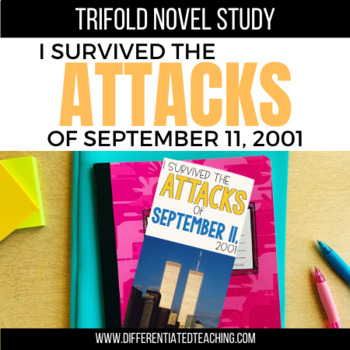I Survived the Attacks of September 11, 2001 Novel Study
- PDF
What educators are saying
Also included in
- The I Survived... series is a favorite of students in third, fourth, and fifth grade. This bundle contains comprehension and vocabulary resources for your historical fiction novel studies, book clubs, or literature circles with 8 titles in this great series. Skills are aligned to Common Core standaPrice $40.00Original Price $56.00Save $16.00
Description
This printable novel unit for I Survived the Attacks of September 11, 2001 is ideal for September literature circles or book clubs. Daily comprehension practice requires students to focus on text analysis and responding to literature, and the vocabulary focus builds word knowledge and academic vocabulary.
This I Survived... Novel Study engages students, but it doesn't overwhelm your readers with countless chapter questions that just require them to regurgitate the text.
Standards-aligned & perfect for novel studies, small group book clubs or lit circles, independent reading, or as a way to monitor and teach during your read aloud.
Your download includes:
• Instructional planning guide
• 2 paper-saving novel study trifolds - 10 instructional days - color & blackline
• 2 weekly word of the day flip books for text-based vocabulary
• Cut & paste comprehension prompts for interactive journals
• Easy-to-follow directions for printing & prep
• Trifold Answer keys
Skills addressed:
✔Character Development
✔Responding to Literature
✔Problem & Solution
✔Cause & Effect
✔Summarizing
✔Text Analysis
And more!
Benefits of Trifolds over Traditional Novel Units:
❑ Foldable format provides novelty and encourages student engagement
❑ Daily comprehension focus builds reading comprehension skills vs. plot recall
❑ Less overwhelming to reluctant readers and writers
❑ Requires deep analysis and application of text-based knowledge
❑ Encourages discussion about skills & strategies
Other Titles Currently Available in the I Survived series:
- I Survived the Sinking of the Titanic, 1912
- I Survived the Shark Attacks of 1916
- I Survived the Bombing of Pearl Harbor, 1941
- I Survived the Eruption of Mount St. Helens, 1980
- I Survived Hurricane Katrina, 2005
Terms of Use:
© 2020 Rebecca Davies. All rights reserved by the author. These materials are intended for personal use by a single classroom only. Copying for more than one teacher, classroom, department, school, or school system is prohibited. For use in multiple classrooms, please purchase additional licenses. This product may not be distributed or displayed digitally for public view. Failure to comply is a copyright infringement and a violation of the Digital Millennium Copyright Act (DMCA). Clipart and elements found in this PDF are copyrighted and cannot be extracted and used outside of this file without permission or license. See product file for clip art and font credits.
Questions?
Click here to contact me directly via email.






